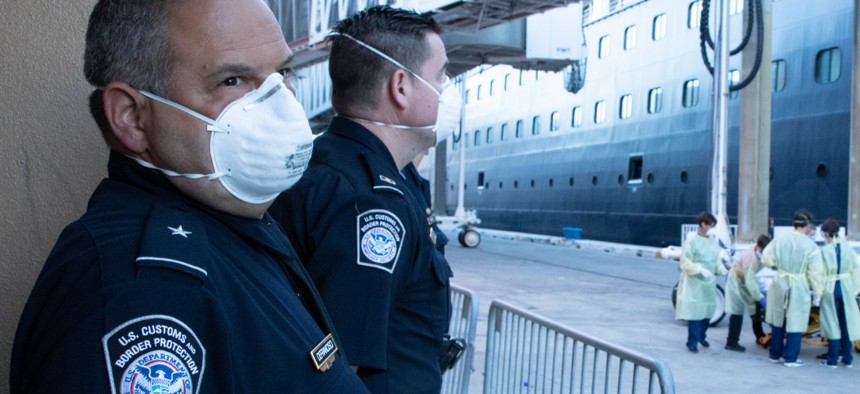
U.S. Customs and Border Protection officers wear personal protective equipment to guard against coronavirus as they facilitate the arrival of passengers and crew disembarking cruise ships at Port Everglades, Florida, on April 3. Gary Gillard / U.S. Customs and Border Protection
Border Agency Cancels Weather and Safety Leave for Some Employees, Angering Union and Lawmakers
The agency had been using weather and safety leave to mitigate employees’ potential exposure to the coronavirus, but cancelled that practice along the northern and southern borders because of “COVID-19 related requirements.”
Democratic lawmakers and a federal employee union are calling on U.S. Customs and Border Protection to restore temporary workplace flexibilities aimed at keeping employees at the border and ports of entry healthy during the coronavirus pandemic.
In the wake of the COVID-19 outbreak, the agency offered employees a program where the use of weather and safety leave gave CBP officers flexibility to reduce their exposure to travelers who potentially could be carrying the coronavirus. The reduced hours were possible because of the significant decrease in traffic both across the border and at ports of entry in recent weeks.
But last week, CBP announced it was cancelling weather and safety leave for employees in the Office of Field Operations along the northern and southern borders, sparking outrage among union officials and some lawmakers. As of April 7, at least 160 CBP employees had tested positive for COVID-19.
“As you know, the pandemic and related restrictions on cross-border travel have reduced border crossings by as much as 75%, if not more in some locations, resulting in greatly reduced activity at the ports,” wrote Tony Reardon, national president of the National Treasury Employees Union, in a letter to acting Homeland Security Secretary Chad Wolf. “This provided the opportunity for CBP to adjust work schedules and use weather and safety leave to reduce current staffing, thereby creating more distance between employees at work, while reducing the number of employees interacting with each other and the public.”
Rep. Debbie Dingell, D-Mich., last week wrote that with the end of the flexible scheduling program, employees already are far more at risk of exposure in her home state.
“Since this flexible scheduling policy has been rescinded and most CBP officers have been called back to work every day, we have received reports that there are over 30 officers congregating in a meeting room because they have nowhere else to go,” she wrote. “[Not] only does rescinding this flexible scheduling program make it harder to practice social distancing in the workplace, it is also increasing the chances that an outbreak could occur among CBP officers in Detroit.”
Despite the significant reductions in traffic at the borders—as of April 1, there was a 72% decrease in vehicle border crossings and an 83% decrease in pedestrian traffic—a CBP spokesperson told Government Executive that the agency needed to rescind the program due to “COVID-19 related requirements” at the northern and southern borders.
“This decision was necessary to further ensure we protect the American people from the spread of COVID-19 as we prepare for the potential increased influx of migrants along our southern borders who may carry the virus,” the spokesperson said. “[CBP] is pursuing related means to address the threat along our land borders. For instance, since COVID-19 has suspended all CBP training to include the Border Patrol Academy basic training, CBP is leveraging the existing manpower of academy instructors and trainees to maximize [the Border Patrol's] ability to detect and interdict attempted illegal border crossings.”
But in a letter to Wolf last week, House Homeland Security Committee Chairman Bennie Thompson, D-Miss., noted that the agency recently reduced the hours at border crossings.
“On April 6, 2020, CBP implemented reduced hours of operations at 45 ports of entry along the northern and southern borders due to diminished cross-border traffic,” Thompson wrote. “Inexplicably, that same day CBP announced it was immediately cancelling weather and safety leave for CBP officers. This decision unnecessarily puts the health and safety of CBP officers at risk, potentially undermining their mission and exacerbating community spread of COVID-19 at our borders.”
Reardon said that he had hoped to be able to hail the reduced hours program as a successful example of labor-management collaboration to meet both employees’ needs and the agency’s mission.
“Field office and port directors working collaboratively with employee representatives towards these objectives sent an encouraging and strong message to CBP employees; that CBP cares about their wellbeing and that of their families,” he wrote. “It boosted morale. The cancellation announcement is crushing at a time when CBP can least afford it.”







